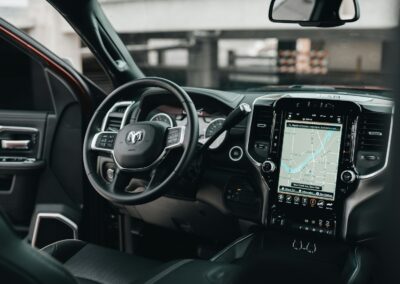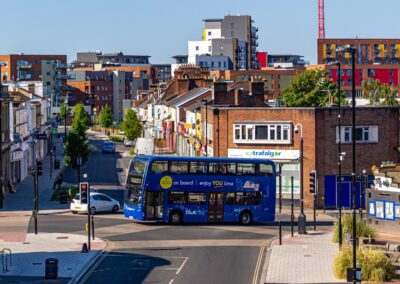Leveraging Connected Vehicle Data to Optimize Traffic Flow and Minimize Congestion
Enhancing Traffic Management with Real-Time Data
The integration of connected vehicle data for traffic management offers transformative benefits for urban environments, especially in rapidly developing regions such as Saudi Arabia and the UAE. This innovative approach harnesses real-time data from connected vehicles to optimize traffic flow and reduce congestion, contributing significantly to urban efficiency and sustainability. By utilizing advanced technologies like Artificial Intelligence (AI) and Blockchain, cities like Riyadh and Dubai are setting new standards in smart traffic management.
Connected vehicles continuously generate vast amounts of data, including speed, location, and route information. This data, when processed in real time, provides valuable insights into traffic patterns and potential bottlenecks. Traffic management systems can use this information to dynamically adjust traffic signals, provide real-time updates to drivers, and optimize traffic flow. For instance, AI algorithms can predict congestion trends and suggest alternative routes to avoid traffic jams, thus improving overall traffic efficiency in busy metropolitan areas.
Furthermore, the use of Blockchain technology ensures the security and integrity of the data collected from connected vehicles. By maintaining a tamper-proof ledger of vehicle data, Blockchain enhances trust in the system, encouraging wider adoption of connected vehicle technologies. The implementation of such secure and efficient traffic management systems aligns with the strategic visions of Saudi Arabia and the UAE, promoting smart city initiatives and enhancing the quality of urban life.
Reducing Congestion through Predictive Analytics
The ability to predict and manage congestion is one of the most significant advantages of using connected vehicle data. In regions like Riyadh and Dubai, where rapid urbanization has led to increased traffic challenges, predictive analytics play a crucial role in congestion reduction. By analyzing historical and real-time traffic data, predictive models can forecast traffic conditions and identify potential congestion points before they occur.
These predictive capabilities enable traffic management authorities to implement proactive measures, such as adjusting traffic signal timings, deploying traffic control personnel, and providing drivers with real-time navigation updates. This proactive approach helps in preventing traffic build-ups and ensures a smoother flow of vehicles. Additionally, connected vehicle data can inform long-term urban planning and infrastructure development, allowing cities to design road networks that accommodate future traffic demands more effectively.
The reduction in congestion not only improves travel times for commuters but also has broader economic and environmental benefits. Reduced traffic congestion leads to lower fuel consumption and emissions, contributing to sustainability goals. For business executives and entrepreneurs operating in Riyadh and Dubai, improved traffic conditions translate into increased productivity and lower operational costs. By leveraging connected vehicle data, these cities are enhancing their competitiveness and attractiveness as global business hubs.
Driving Business Success through Technological Integration
The successful integration of connected vehicle data into traffic management systems requires effective leadership and strategic change management. Business executives and mid-level managers play a pivotal role in driving this transformation. Executive coaching services can equip leaders with the necessary skills to manage the complexities of implementing advanced traffic management technologies. In Saudi Arabia and the UAE, where innovation is a key driver of economic growth, executive coaching helps leaders navigate the challenges of technological integration and fosters a culture of continuous improvement.
Change management strategies are essential to ensure that all stakeholders are aligned with the new technological advancements. This involves clear communication, comprehensive training programs, and stakeholder engagement to address potential resistance and ensure a smooth transition. Effective communication is particularly important in coordinating between public authorities, private enterprises, and the general public. By fostering collaboration and transparency, cities like Riyadh and Dubai can maximize the benefits of connected vehicle data for traffic management.
Moreover, the adoption of AI and Blockchain in traffic management systems opens new opportunities for businesses to innovate and expand. Companies specializing in AI, data analytics, and Blockchain can collaborate with public authorities to develop and implement cutting-edge solutions. This not only drives business success but also contributes to the overall economic development of the region. By embracing connected vehicle data and advanced technologies, Saudi Arabia and the UAE are paving the way for a smarter, more efficient future in urban transportation.
#ConnectedVehicles #TrafficManagement #CongestionReduction #AI #Blockchain #SaudiArabia #UAE #Riyadh #Dubai #ExecutiveCoaching #ChangeManagement #Leadership #ProjectManagement #BusinessSuccess #ManagementConsulting























